
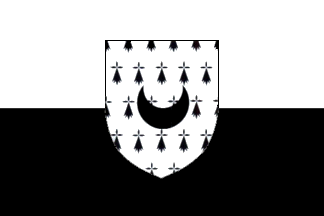

Flag of
Cornwall, UK;
Flag of Verquigneul, France;
Flag of Tal-Pietà, Malta
2) See jolly roger 1).
3) See mourning flag.


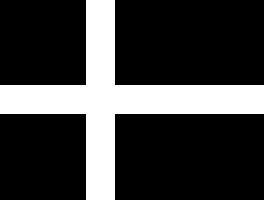
Flag of the Anarchists; Flag of
Edward Lowe c1719;
Mourning Flag, Denmark

Marcus Garvey's Flag 1917
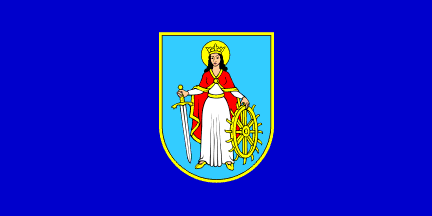
ri-lk.gif)
Flag and Arms of
Lokve, Croatia
l.gif)
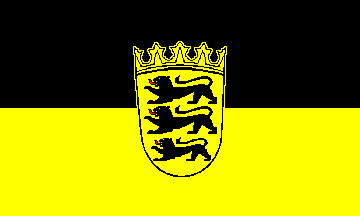
Lesser Arms and State Flag of
Baden-Württemberg, Germany
ri-om.gif)
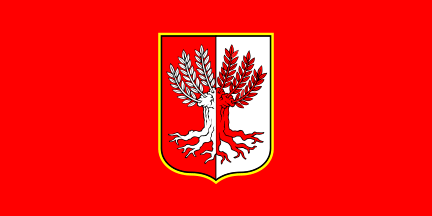
ka-br.gif)
Arms of Omišalj,
Flag of Gornja Vrba and
Arms of Barilović, Croatia
Notes
This term and its use should apply only to heraldic symbolism, and be employed in vexillology
solely in that context, so the shields illustrated above may be blazoned as follows:
a) Gules, a tower embattled Argent issuant from a base Azure and in chief a mullet Or;
b) Parti per pale Gules and Argent overall a willow tree eradicated of the second and first counterchanged;
c) Gules a bend Argent between two swords in bend of the same
hilted and pommelled Or.
vi-mi.gif)

kr.gif)
Arms of Mikleuš,
Flag of Martijanec and
Arms of Krapina-Zagorje, Croatia
Notes
The shields illustrated above may be blazoned as follows:
a) Gules a bend between three balls and an oak twig all Or;
b) Gules in base a mount Vert at fesse point a sword in bend Argent hilted Or surmounted by a mitre of
the third garnished of the fourth;
c) Party per pale and per bend embattled Gules and Or in chief three mullets of the second and first counterchanged.
2) In English then British RN usage, now obsolete (and largely – but not exclusively – dependent upon the seniority of the admiral in command), the junior of three alternative (undefaced) ensigns carried by a warship until 1864 – see red ensign 2), white ensign 2), yellow admiral and note b) below.
3) Generically, any canton flag (either plain or defaced) with a blue field – particularly (but not exclusively) if flown at sea – a British-style ensign (see also canton flag 1), deface and red ensign 3)).
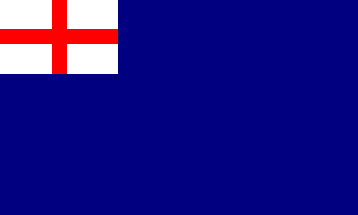

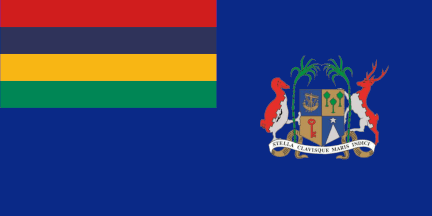
Blue ensign c1630–1707, England;
Reserve Ensign, UK;
Government Ensign, Mauritius
Notes
a) With regard to 1), the blue ensign is also used either plain or
defaced as the ensign of many British yacht clubs, as a template (or archivexillum) for the flags of
Government departments and – with few exceptions –
of British Overseas Territories (see also armorial ensign 2),
colonial flags,
defaced, template flag and
warrant).
b) Regarding 2), before 1864 an Admiral’s seniority was outwardly displayed by the
colour of his command flag and by the ensigns flown by any ships under his command – the junior colour
being blue, the next white and the senior red – however, in 1864 this colour system was abolished, and
thereafter all flag officers flew a white command flag from the appropriate masthead where applicable,
and all Royal Naval ships the white ensign (see also distinction of colour
and flag of command 1)).
c) Furthermore, the ensigns worn within a fleet could be arbitrarily changed (if the tactical
situation required it) by order of the Flag Officer in overall command of that fleet irrespective
of the grade held by any of his subordinate admirals.
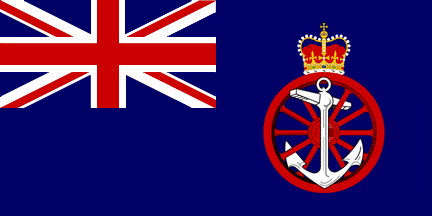
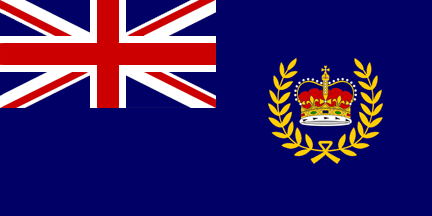
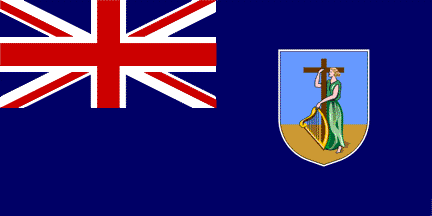
Ensign of the Department for Transport, UK; Ensign of the
Royal Corinthian Yacht Club, UK;
Flag of Montserrat
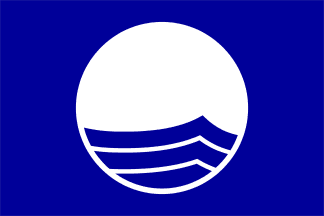
Beach Quality/Blue Flag, European
![[Blue Jack]](../images/v/vx-roymariaux.gif)
![[Blue Jack]](../images/v/vx-gb~nlbj.gif)
![[Blue Jack]](../images/v/vx-gb~botoldj.gif)
Jack of the Royal Maritime Auxiliary, UK (Graham Bartram);
Jack of the Northern Lighthouse Board, UK;
Jack of the Board of Trade c1939, UK
![[Blue Peter - ICS Papa]](../images/v/vx-ics~papa.gif)
Signal Flag P (Papa)
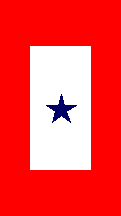
Blue Star Banner/Service Flag, US
Please note with regards to 1) that the ship's boats of naval vessels would not normally wear ensigns when operating in an anchorage if no foreign ships are present.
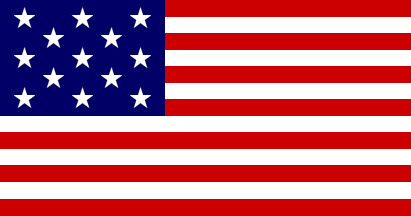
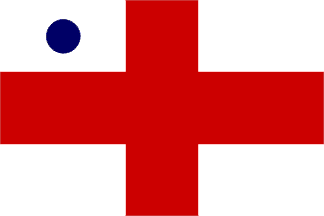
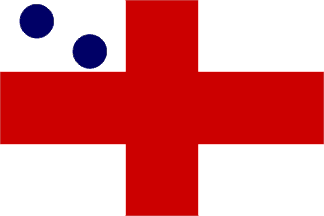
Late 18th century, US; Boat Flags of a
Vice-Admiral and Rear Admiral of the White c1702–1864
Notes
a) With regard to 3) these flags came to be flown aboard major vessels from c1872 onwards because the abandonment of an auxiliary sailing rig (due to the increased efficiency of marine engines and the weight of armour plate) meant that there was only one mast available from which to display a flag of command, and the previous system of varying mastheads to denote seniority, therefore, no longer viable.
b) The current versions of UK command flags date from regulations of 1898. These regulations reduced the width of the red cross, increased the size of the balls and changed their position on the flag of a rear-admiral (as illustrated below).
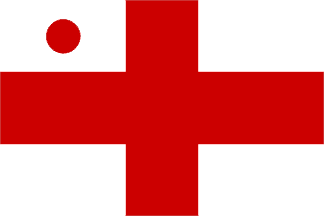


Boat Flags then Command Flags of a Vice-Admiral
and a Rear-Admiral 1864–1898, UK; Flag of a
Rear-Admiral according to current regulations
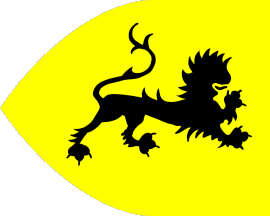
Flag Ascribed to Ibernia, 14th century
![[flags with borders]](../images/v/vx-mv.gif)
![[flags with borders]](../images/v/vx-ch-ag004.gif)
![[flags with borders]](../images/v/vx-pt_pm.gif)
National Flag of Maldives; Flag of Densbüren, Switzerland;
Prime Minister's Flag, Portugal
Please note – not to be confused with a fimbriation which is invariably plain and whose sole purpose is to divide one colour from another (see also charge, fimbriation rule of tincture).
![[bordered]](../images/v/vx-pt-1485.gif)
Flag of King João II, Portugal 1485–1495
![[border of three]](../images/v/vx-ca-pe.gif)
![[border of three]](../images/v/vx-ca-onamb.gif)
Flag of Prince Edward Island, Canada;
Flag of Ameliasburgh, Canada
![[Hungary president]](../images/v/vx-hu-pres.gif)
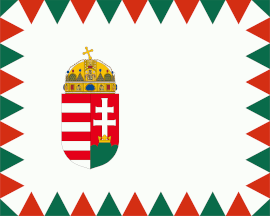
Presidential Standard of Hungary;
War Ensign of Hungary
![[bordure]](../images/v/vx-es-ic-pa.gif)
![[bordure]](../images/v/vx-hr-sb-op.gif)
![[bordure]](../images/v/vx-pt-hrt.gif)
Flag of La Palma, Spain;
Flag of Oprisavci, Croatia;
Former Flag of Horta, Portugal
![[borough arms]](../images/v/vx-gb-e-wesm-sh.gif)
![[borough arms]](../images/v/vx-gb-e-wesm-coa.gif)
Arms of Westminster 1601 and 1964, UK
![[borough flag]](../images/v/vx-de-lp-hb.gif)
![[borough flag]](../images/v/vx-gb-eseos.gif)
Flag of Horn-Bad Meinberg, Germany;
Flag of Southend-on-Sea, UK
![[bow flag]](../images/v/vx-ar~j.gif)
Naval Jack of Argentina



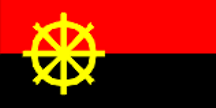
![[flags with borders]](../images/v/vx-cz-ho-kj.gif)
![[flags with borders]](../images/v/vx-kyjov).gif)
![[bow pennant]](../images/v/vx-cocktailflag.jpg)